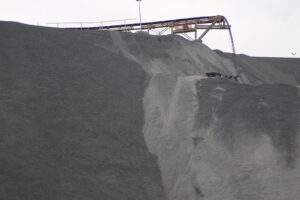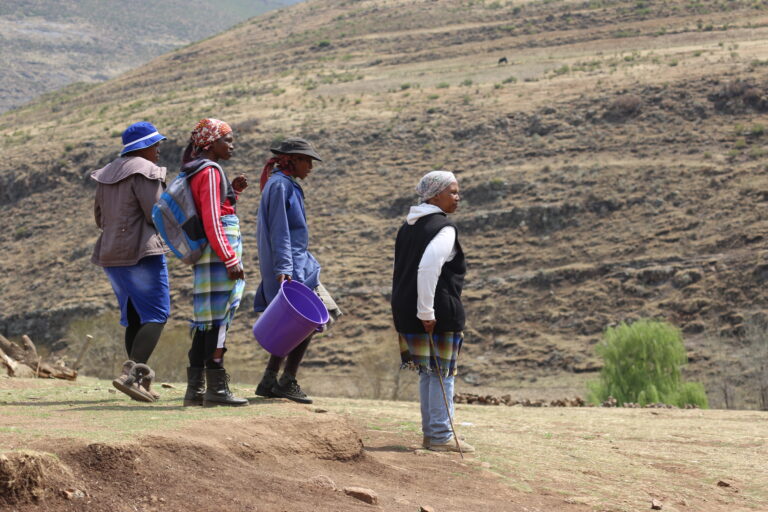A Lesotho environmental law expert says it is alarmingly troubling that the once pristine African land continues to be sacrificed at the altar of profits by multinational companies extracting the continent’s minerals for financial gains.
Advocate Borenahabokhethe Sekonyela says allowing multinational companies to dirty the African environment and its ecosystems with impunity is a violation of fundamental African customary laws that seek to protect the land.
“The multinational companies are clearly maximizing profits at the cost of life in Africa,” Advocate Sekonyela said.
He says fundamental principles of African customary laws dictate that Africans have full rights to their land and all natural resources beneath that land, including copper in Zambia, diamonds in Lesotho, and coal in Malawi.
“Africans have full land rights protected by customary laws. Customarily, land is an important asset for Africans. In terms of farming, if one does not own a farm but has cattle, there was a butter system arrangement in place to ensure that we all benefit from that land. This was a fundamental economic theory of our African custom.
“The same principle should apply even in mines because God placed Africans there with all those resources and there should have been an equity share in those resources but that is not the case because African governments have leased out mining areas to multinational companies who are sacrificing our land at the altar of profits,” Advocate Sekonyela said.
He said the expectation that mining companies must conduct their businesses in such a way that even future African generations will benefit from their resources is slowly becoming an unrealistic dream.
“Do it in such a way that you do not destroy my land because it is for my benefit and those that will come after me,” he said.
Zambians Look to South Africa for Justice
A South African high court is expected to pronounce itself on whether or not it has jurisdiction to preside over a landmark class action lawsuit against Anglo American mine in the coming months.
This was after 14 Zambian women and children alleged in court papers that Anglo American “massively” polluted their land when it operated and managed a mine in Kabwe, Zambia between 1925 and 1974.
According to Amnesty International and South African Litigation Centre, the 14 Zambian applicants are acting on behalf of “an estimated 100,000 children and women, who report suffering injury from lead exposure as a result of century-long mineral extraction near their homes.”
The applicants want the South African high court to order Anglo American to compensate them for alleged breach of what Zambians have identified as a “duty of care to protect existing and future generations of residents of Kabwe against the risks of lead pollution arising from the Mine’s operations.”
Amnesty International’s Director for East and Southern Africa, Deprose Muchena, has likened this case to a biblical story of “David vs Goliath case and a significant, long-overdue step towards justice for the people of Kabwe, who have suffered from lead poisoning for years due to the mining activities of multinational corporations in their communities.”
Anglo American has been previously quoted in the media saying “we do intend to defend ourselves because we do not believe that we are responsible for the current situation.”
In an interview with Ubuntu Times this month, Advocate Sekonyela warned that the Zambian case was just a drop in the ocean, saying there were thousands of Africans experiencing serious health complications caused by effects of mining pollution.
“Mining dirties water and it does not matter if you were an imperialist or not, I have a riparian right to drink clean water and any type of development should not jeopardize my right to access clean water,” Advocate Sekonyela said.
Lesotho Government Investigates Water Pollution
In March this year, Lesotho’s Ministry of Natural Resources said it is investigating allegations of water pollution by Letseng Diamonds Mine, Storm Mountain Diamonds and Liqhobong Diamond Mine.
“The Ministry of Natural Resources wishes to acknowledge and notes with concern the various articles that have appeared in the Lesotho and South African press recently concerning the alleged pollution of above-average concentration of nitrates in certain rivers that flow into the Katse Dam,” read a press statement circulated on 1st March 2023.
“The validity of the allegations are being investigated and in addition to having instructed the Department of Water Affairs to report to the Minister of Natural Resources Honourable Mohlomi Moleko, on the allegations.”

Government’s investigations come after MNN Centre for Investigative Journalism published a story that the Lesotho Highlands Development Agency (LHDA), an agency monitoring and managing the Lesotho Highlands Water Project, said mines pollution of critical water sources continues unabated despite the mines’ repeated promises to mitigate contamination during joint meetings chaired by the department of environment.
According to the LHDA, the three mines polluting rivers critical to the water project that transfers water to South Africa are Letšeng Diamonds Mine, Storm Mountain Diamonds and Liqhobong Diamond Mine.
Communities downstream Letšeng Diamonds Mine and Storm Mountain Diamonds have accused the two mines of polluting their water courses with impunity, an accusation the two mines hotly deny. Letseng Diamonds Mine is co-owned by Lesotho government (30 percent) and British-based Gem Diamonds (70 percent).
Since it started operating the mine in 2004, Letšeng states on its website that it has discovered precious stones such as a 910-carat Lesotho Legend (2018); 603-carat Lesotho Promise (2006), 550-carat Letšeng Star (2011), 493-carat Letšeng Legacy (2007) and the 478-carat Light of Letšeng (2008). Collectively, the mine made US$81.2 million (M1.2 billion) from four of those five stones.
Storm Mountain Diamonds’ shareholding is held by the Lesotho government (25 percent) and South Africa’s Namakwa Diamonds (75 percent). Storm Mountain Diamonds’ website states that the mine’s 3.06-carat Kao Purple Princess was sold at US$727, 898.
Coal, Uranium Mines Leave Trail of Destruction in Malawi
The Malawi Economic Justice Network (MEJN) says communities around coal and uranium mining areas in that country “face a lot of challenges with water pollution”.
The Network’s Program Officer, Bertha Phiri has accused the Malawian government of “…not doing enough in protecting the rights and livelihood of people living in mining communities.”
“The law is clear on issues of Environmental Impact Assessment and all its related issues but the biggest challenge is laxity in the enforcement of the law. People living around coal and uranium mining areas face a lot of challenges with water pollution and their land is also affected in terms of productivity and farming let alone their health is at risk as well,” Phiri told Ubuntu Times last week.
Phiri is positive that Malawi should learn from the Zambian lead poisoning and argues that Malawi could have enacted a far much better, inclusive Mines and Mineral Act, 2018 had it taken suggestions from community representatives on board.
“The mines and Minerals Act went through a very rigorous process as far as consultations with relevant stakeholders are concerned. However, consultations do remain consultations up until when all the issues, concerns and suggestion that are brought forward are taken on board.
“Our observation is that Malawi missed an opportunity to address its issues and bring sanity in the mining sector learning from the bad experiences we have had with Kayerekera Uranium Mining. So the enactment of the Mines and Minerals Act would have taken on board lessons learnt which in MEJN’s view did not to the large extent besides stakeholders raising the issues during the consultations,” Phiri said.
















